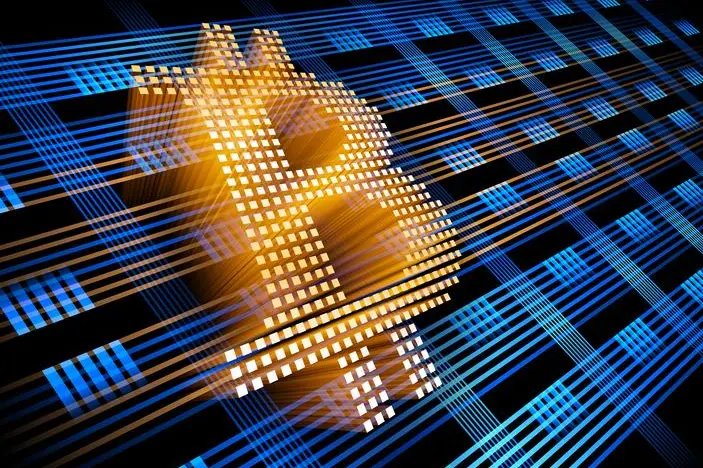PHOTO
(Update added launch date of new spot gold contract)
Dubai Multi Commodities Centre is weighing up the potential for using blockchain technology in its clearing and exchange activities as it seeks to innovate to attract business following a slower trading year in 2017.
The authority in charge of Dubai's largest free trade zone, which was set up to enhance commodities trade flows, owns the Dubai Gold and Commodities Exchange (DGCX) - a derivatives exchange set up in 2005 and which is now the biggest of its kind in the Middle East.
However, trading volumes took a tumble last year, as the number of contracts traded through DGCX dropped by 11.7 percent in 2017 to 17.4 million - down from 19.7 million in 2016. The value of contracts also fell 8 percent to $404.7 billion, but have recovered in the first two months of this year. On Thursday, DGCX said that February had been its best trading month since its inception, citing a 67 percent year-on-year growth as almost 2.1 million contracts changed hands with a value of $47.03 billion.
Les Male, who became the chief executive officer of DGCX last month following the departure of ex-CEO Gaurang Desai on February 18, told Zawya that the reason for the decline in 2017 was more a result of the fact that trading during 2016 had been boosted by geopolitical events that "created excess volatility".
Male, who was previously head of sales for Nasdaq's European commodities business, told Zawya in an emailed statement on Wednesday that “from Brexit through to the election of President Trump and demonetisation in India, we saw volatility in a number of our key markets (in 2016)”.
"This volatility was not present in 2017, and thus lower volumes prevailed, not just for the DGCX, but for a number of other international exchanges.”
Speaking at the fifth annual Global Commodity Outlook Conference in Dubai on February 11, Franco Bosoni, the director of DMCC's Innovation Hub, said that the authority had begun to licence companies within its free zone capable of building blockchain-based infrastructure, as well as permitting the proprietary trading of cryptocommodities, including cryptocurrencies.
“In the coming weeks and months, we have some interesting projects that hopefully you will be hearing about,” Bosoni said.
“We're looking at how we can do settlement and clearing of contracts through blockchain infrastructure,” he added.
As yet, though, DGCX is not planning to provide exchange services for any type of cryptocommodity, including currencies.
Lack of regulation
“Currently, a lack of regulation is inhibiting their growth in professional investment circles,” Male told Zawya.
“Although we expect that to change over time, for the moment we are looking at them in much the same way as a number of other well-known exchanges. We know that distributed ledger (blockchain) technology is the future, and this comes hand in hand with cryptocurrencies.”
One use of blockchain that DMCC is actively exploring is via its new agreement with India’s Cropdata. The agreement, which was signed on February 10 during Indian Prime Minister Narendra Modi’s visit to the United Arab Emirates, pledged to create a digital, pan-India agricultural trading marketplace.
Sanjeev Dutta, the chief executive of DMCC, told Zawya on the sidelines of the conference that the platform creates a price discovery mechanism and a forward market for Indian farmers, which will guarantee them a fair price for the crops they grow.
"Typically, if we look at a farmer's life in India, there are government loans that are given to a farmer, and he uses those loans to grow a crop.
"He goes to market, and, depending on that day's demand and supply, there could be an intermediary who offers him a (price) that is much lower than the cost of production. The poor farmer is left with no choice to accept whatever price he is offered or to throw the crop away because he has no storage.”
Guaranteed price
This can lead to widespread defaults on government loans, Dutta said, but if a farmer knows he can get a fair, guaranteed price for his crop at a specified delivery date in the future, this can be avoided.
"The farmer gets his margin, makes a profit and repays the loan. From a government perspective, there are no write-offs. Banks can then lend at better rates.”
The other, major initiative likely to be brought forward soon is DGCX’s new Shariah-compliant Spot Gold contract, which has been under development for some time. DGCX worked with Islamic Finance consultancy Amanie Advisors on gaining Shariah compliance for its spot gold contract, and Male told Zawya that it has now received regulatory approval.
"Over the years we have launched a number of internationally relevant products, but we have always wanted to create a product for the UAE and wider GCC region," he said. “Sharia-compliant Spot Gold will give us our first foray into the oft-neglected Islamic Finance investment space.”
On Tuesday (5 March) afternoon, DGCX announced that trading in the Shariah Spot Gold contract would begin trading on March 29.
The contract was one of a number of initiatives discussed during the 5th Global Commodities Outlook Conference, which held a series of panel debates analysing trends likely to shape the main commodities markets over the next 12 months.
Zawya presents the highlights of the key panel debates:
- Energy markets - comply or die: Where will the price go in 2018?
- Precious metals: New Shariah-compliant contract and concerns over impact of VAT
- Agriculture: Will weather fluctuations make traders less complacent?
Click here for our full special coverage on the outlook for commodities in 2018
(Reporting by Michael Fahy; Editing by Shane McGinley)
(michael.fahy@thomsonreuters.com)
Our Standards: The Thomson Reuters Trust Principles
Disclaimer: This article is provided for informational purposes only. The content does not provide tax, legal or investment advice or opinion regarding the suitability, value or profitability of any particular security, portfolio or investment strategy. Read our full disclaimer policy here.
© ZAWYA 2018





















